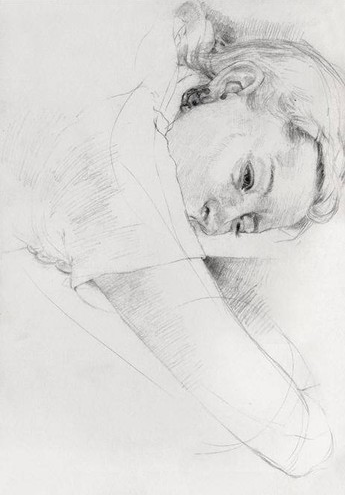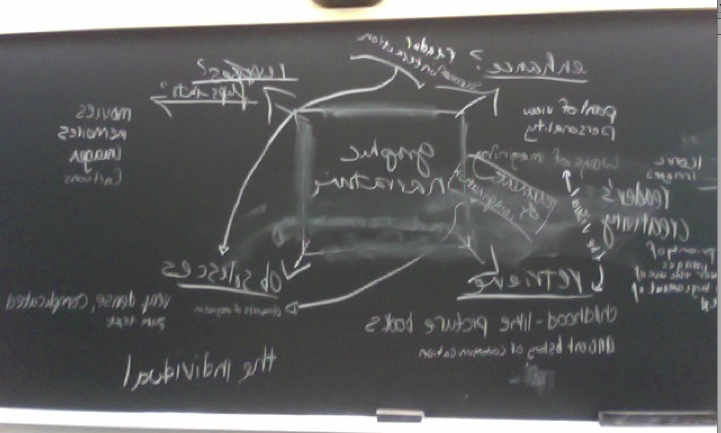Serendip is an independent site partnering with faculty at multiple colleges and universities around the world. Happy exploring!
Ayla's blog
It's Real
I was a child racked with nightmares. I spent many nights whispering for my dad in the night, sweating and stricken to my bed, wondering why he couldn’t hear me. I would dart down the hall to his bed and shake him awake “Daddy! Daddy, can I sleep with you?” I would gladly crawl into his bed, cuddle with my stuffed animal, and fall peacefully asleep. When I began to grow too old to be sleeping in my dad’s bed any longer, we had to have a talk. “It’s not real,” he said. “It’s all in your head. Just tell yourself in your nightmare that it isn’t real and I promise you won’t be scared anymore.” So my nightmares came less frequently and less intensely. I befriended the witch that hexed me and the ugly creature that always chased me turned out to have a sweet spot.

Not learning anything
I don't know what I knew before and I don't know what I know now. I knew I didn't know anything before and I know I don't know anything now.
What wasn't said
I'm very disappointed with Bryn Mawr's time limits for classes. I thought our discussion of Adaptation was an important one to have since we compared the movie to the book and talked about what the movie was about and it's value etc. However, I was so disappointed with what was not said - or rather what there wasn't time for. OK, we can't agree on if Adaptation was a good/poor representation/purposeful-non-representation of The Orchid Thief. Fine. I guess I thought we could take the film at face value at least - meaning what the movie in of itself does and how it reflects the messages in The Orchid Thief. I guess the example that stands out to me the most is that Charlie kept saying he wanted to show people that flowers were pretty. In the movie, Charlie "writes in" a scene that didn't happen in The Orchid Thief. When John is leading Orlean to see the ghost and John is lost, he gets very frustrated. John says (something along the lines of), "People are always leeching off me. Get your own passion! Stupid bitch." When Orlean sees the ghost orchid, she says, "It's just a flower." She couldn't adopt anyone's passion or fascination with orchids because it wasn't hers. This scene parallels Charlie's inability to make a movie that 'shows people that flowers are pretty.' This is precisely because even if he had made a movie that exhibited flowers, he would not have succeeded. He would not be able to force his audience adopt an appreciation for flowers.
Me, myself and I
I noticed in class that everyone's movie version of The Orchid Thief emerged from their own personalities. I am the most ironic romantic - a story for another time - and consequently, my movie was a love story. I was thrilled by the idea that a writer searching for the 'facts' who seems really down to earth, who claims she isn't passionate, etc. totally falls in love with LaRoche. Even when I read the book, I kept waiting for something to happen between them - it was killing me. So my movie was a love story of a mismatched couple.
KT prefaced her movie with "we need something to draw people in." KT worked in marketing; therefore she was most concerned about making something that would sell.
Anne told us that her movie is "very word based." She took one quote from the book and made it her first scene. Then she based her other scenes off of other quotes from the book she had picked out. No wonder Anne wanted to preserve the book's message as much as possible - she's an English teacher.
One system does not work for everyone
One System Does Not Work for Everyone
When I was in middle school, I had to take a physical education class every other day. Every week, on the last day of class, our teachers would let us choose a sport that we wanted to play: kick ball, soccer, basketball or walking. Of course, I chose soccer every time - it is my favorite sport to play. After about three weeks, the teachers realized that the same people were picking the same sports to play every time. They announced that since some students were dominating one sport, they were going to create a structured space for all students to play each sport. So they put us in groups and rotated us throughout the sports. What happened to free play? The teachers thought that students who were always walking every week secretly wanted to play soccer. They thought they were doing them a favor, but those students just stood on the field. They didn’t want to play a contact sport with lots of competition and running. They wanted to relax and think and walk.
Mid Semester Eval & Personal preference for future study
I am very much enjoying the conversations in class, and I think that I have learned from my classmates' comments and perspectives. For me, I like to think about the underlying questions that we are pondering in the context of assigned readings. So far, I think about questions such as "If everyone supported this concept, what would that look like," "How do we learn differently from different genres, and how do writers manipulate that learning by choosing a certain genre," "What are the presumptions or prejudices about genre and forms of writing," "If we expect the writing world to promote the evolution of a certain genre how does this impact structure and does that matter," "What does the evolution of a genre mean, anyway," and finally, "What is the message of this class?" So as we listened to our BMC guest speakers about their digital projects, I was wondering not so much about how they accomplished it or what they expected from it, but rather I thought about the purpose of having a piece of writing so accessible. When we read Satrapi's graphic novel, I thought about the reason she wrote it and the reason she chose to write it in a graphic novel. When we read "Mad at school," I thought about the breakdown of structures that we know if everyone were to promote the evolution of this type of education. There are more examples that are too numerous to write in this small jaded space.
Value of one visual interpretation
When I was writing this post, I was trying to come up with some universal key motives that authors have for writing a story. I suppose I wanted to say that authors write a story to relay a message, specifically in a certain environment that they construct in their minds. (If anyone thinks that this is not the case, I'm curious to debate whether or not that is true). So it is the author's job to use words and context in order to give the reader an essence of the story and the environment. Still, there is a level of uncertainty that is unavoidable - whether this is the author's intent or not. In class we debated which type of writing allowed more freedom of interpretation - comics or the traditional novel. The discussion seemed to rely on the glories of being able to have that freedom as a reader as opposed to the narrow view of a story. On the board, I wrote that when comics are pushed to their limits, they turn into movies. Movies are a certain visual interpretation of a story, certainly with a narrow view of what the characters look like and how they react to certain events throughout the story. Often, readers are disappointed by movie interpretations of their favorite books because it is not what they had pictured, the movie was forced to leave out important events, or the movie altered the storyline. We, as readers, cannot accept the alternate story when film directors change the plot.
Photo of our Board Discussion (the graphic novel)
Hmm... this picture is backwards...that's strange.

Crooked Beauty: Navigating the line between brilliance and insanity
Mental health is a personal interest of mine - mainly because it is so personal to me, but also because I like to think that there is a connection between mental disorders and brilliance. Newton, Michaelangelo, Nash, Einstein, Van Gogh, Aristotle - so many great minds in history who are thought to have had some sort of mental disorder (by studying their personal journals or historical accounts about their personalities). As I said in class, I indulge in being part of a community of people who have the same mental disorder as I do. It is my personal preference to dive into the idea that mental illness and intelligence are connected. Very smart people come with baggage.
I watched this short (30 minute) documentary film about a young woman and her experience with bipolar disorder. "Crooked Beauty: Navigating the line between brilliance and insanity" is a personal documentary in which the author, Jacks McNamara, advocates for people to live with their madness and use it as a tool for inspiration and creativity. She specifically does not support allowing people to use their diagnosis as an excuse, or a burden reliever. She did not appreciate being medicated so that her 'radio transmitters' were shut down, and she more easily glanced over the world's suffering, instead of being so sensitive to it.


